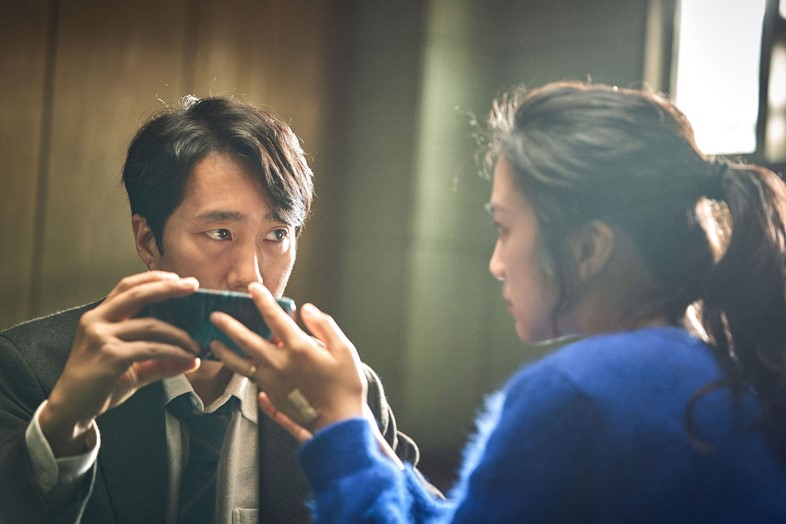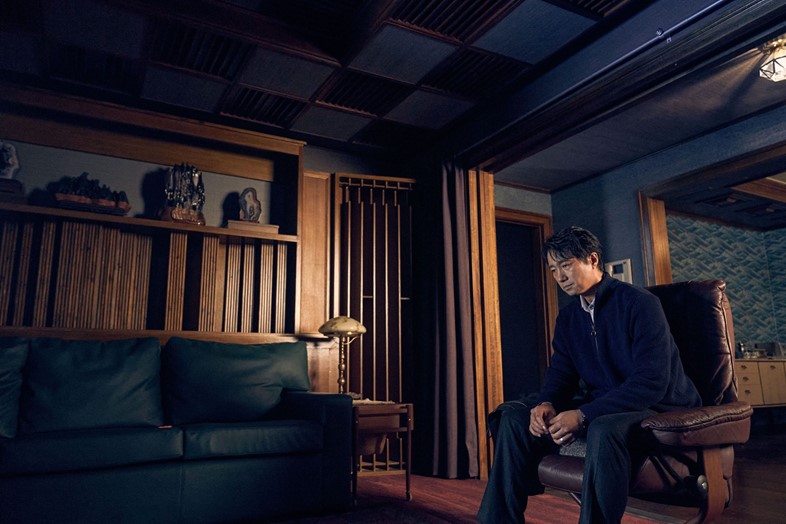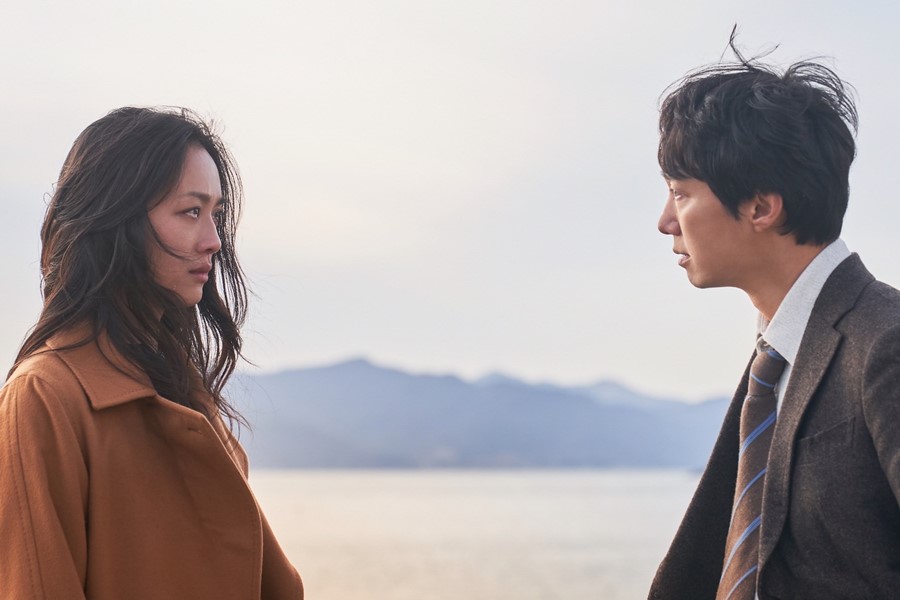As the director’s latest film Decision to Leave is released, the Korean auteur talks about shifting the focus from sex, and his obsession with obsession
There’s a certain kind of detective film that gives you a mystery to solve, throws in a few red herrings and gotcha moments along the way, and wraps it all up in a nice tidy bow by the end. Decision to Leave is not that film.
In Park Chan-wook’s ravishing new noir, the act of detecting becomes an end in itself – like pulling, as David Lynch once memorably put it, “on a string with no end”. Its mysteries are not merely cases to be solved, they are existential forces to be reckoned with. Mood trumps tempo, clues reveal as much about character as they do about plot, and the choice of interiors alone could command a thousand internet ‘deep-dives’. It’s a film about obsession sculpted with a care that frequently skirts the obsessive, from a director whose past proclivity for outlandish sex and violence (Oldboy, The Handmaiden) has sometimes been allowed to obscure what an absolute master of his craft he is.
But, if Decision to Leave is relatively restrained by the Korean auteur’s standards, its precision marks it out as unmistakably his own. It’s a gorgeous puzzle-box of a movie that crackles with erotic tension and, thanks to its bravura editing, a curiously poetic sense of time. Of course, Park could have told this story in a linear style and made it a lot more legible to the casual viewer. But it wouldn’t be half as beautiful, as beguiling – nor would it reflect the growing desperation of its protagonist, married cop Hae-jun (Park Hae-il), as he unravels in his quest to understand Seo-rae (Lust, Caution’s Tang Wei), a beautiful Chinese immigrant suspected of murdering her husband.
Like the film, Park does not give up secrets lightly – ask him via his translator why it is the pair don’t consummate their love affair with the kind of acrobatic sex scenes that punctuated his last film, The Handmaiden, and he’ll reply coyly, “Who says that they don’t?” At London Film Festival, we sat down with the maestro to journey ever-deeper into the mystery at the heart of his story.
(Warning: mild spoilers ahead)

Alex Denney: You’ve made a film about obsession that is loaded with an obsessive amount of detail. How much are you like Hae-jun in this respect?
Park Chan-wook: It’s true that I am quite obsessive about all the details in my films and making sure that my film is as perfect as possible. But that’s really only for the filmmaking side; I don’t think it’s related to Hae-jun’s characterisation.
Alex Denney: His walls are littered with pictures from cold cases he’s worked on – is your house a little like that when you’re storyboarding a film?
Park Chan-wook: Not that much! Of course, I storyboard all my films from scene one until the very final scene; the entire film is storyboarded as if it’s the final edited version, including just simple scenes with two people having a conversation. But once that is done and the camera starts rolling I kind of relax and make jokes with my DOP, so I can say that my obsessiveness doesn’t extend to the shooting period.
Alex Denney: What drew you to Tang Wei and Park Hae-il for the lead roles in the film?
Park Chan-wook: With Tang Wei of course Lust, Caution is one of the films, and there’s also a Korean film made by her current husband, Kim Tae-yong, called Late Autumn. It’s not really well known to the world but it’s another film I watched and became convinced that Tang Wei is Seo-rae. With Park Hae-il, ever since he starred in Memories of Murder we had many mutual friends including Bong Joon-ho, so there were many occasions when we met up for drinks or a meal. His CV speaks to the kind of actor he is, but to me what was important was the kind of person he is.
When I had my first conversation with my co-writer [Jeong Seo-kyeong] on the film, I said, ‘This character has many pockets in his jacket, he is very kind-hearted, he’s clean, he’s courteous – you know, just imagine someone like Park Hae.’ So that was actually a reference point, he’s the image I had in mind for the character. Because Park Hae as a person is just like [that], and on top of that he has a pure soul. He always puts others before him, but if a person is just kind and good the character would be boring: Park Hae is a good person but he has a particular quirkiness to him, just in the way he imagines things. And sometimes he makes other people laugh, unexpectedly.

Alex Denney: Hae-jun is quite a conservative character, isn’t he? Old-fashioned, even. Is that why he’s so troubled by his growing fascination for Seo-rae?
Park Chan-wook: Hae-jun plays by the book and that’s something his junior detective finds quite frustrating; he’s the kind of inflexible person who brings out that kind of reaction from others. And then he encounters this woman who will push him to the point where he’s broken, and the audience is going to go on that journey with him and observe that process. When Seo-rae talks [about the time] “you told me that you loved me” towards the end of the film he says, “When did I say that?” and it’s frustrating because Hae-jun is the kind of person who thinks that people can only express one’s love towards one another when it’s done in words. Whereas Seo-rae is more flexible in terms of the way she thinks; she has a more liberal attitude towards seeing and interpreting things. And in the end he's completely shattered; he’s almost crying like a baby. This detective who [has always been] dignified and proud is pushed over the edge and now faces his own collapse.
Alex Denney: Even before Seo-rae turns up, Hae-jun has problems – he’s depressed, suffers from insomnia, and is possibly impotent. What do you see as being at the root of his depression?
Park Chan-wook: Well, I didn’t really get into that too much in the film, but there is some evidence that points at the root of his depression as feeling trapped in the routine of his life.
Alex Denney: Is he like a lot of middle-aged Korean men in this regard?
Park Chan-wook: I don’t want to specify only Korean men; I think what can resonate with people is that Hae-jun is a portrait of anyone in the world who is living in the urban environment of today, being trapped in the routine of their lives and really feeling lost.
Alex Denney: How does Seo-rae change all that?
Park Chan-wook: When Hae-jun encounters Seo-rae for the first time with the body of the dead husband lying on the bead, he gives her this very piercing stare at her and says, “I would like to know the pattern,” and of course it’s got dual meaning to it, because he would like to know the [unlock] pattern on her cell phone but also [he’s saying], “I would like to know who you are.” It’s a sign of curiosity about this enigmatic woman who has entered his routined life.
Alex Denney: A few people seemed surprised by the lack of sex in the film, which you have countered by saying the story didn’t need it. Why do you think Hae-jun and Seo-rae don’t sleep with each other?
Park Chan-wook: Well, who says that they didn’t? It’s really up to the audience; the film doesn’t say out loud if they did or didn’t sleep together. Because of the time-jump editing there is a certain period of time that’s been omitted, and what happened during that period nobody knows. But let’s say they didn’t. I would say Hae-jun’s old-fashionedness is behind that, him being a policeman and being married meant it was unacceptable to his moral compass; that’s just how he perceives the world.
Alex Denney: Similarly, why do you think it never seems to occur to Hae-jun that he could just get a divorce?
Park Chan-wook: There are many interpretations that can be made but once again the way that I and Park Hae-il see the situation is that even though this couple is stuck in that routine and they’re kind of tired, Hae-jun still cares for her and they have a certain respect and affection for each other.
Alex Denney: Do you think Hae-jun needs that routine on some level, even while he subconsciously looks for a way out of it?
Park Chan-wook: That’s a very intriguing interpretation and it makes sense, even though I never verbalised it, I agree where you’re coming from.
Decision to Leave is out now.
